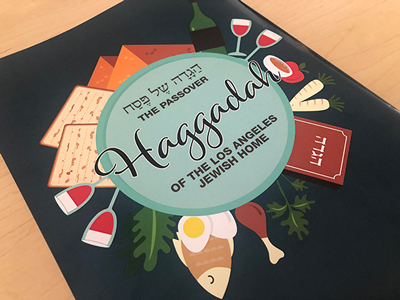How to Host a Community Seder While Social Distancing


How to Host a Community Seder While Social Distancing

The Community Seder is not only a beloved tradition at the Los Angeles Jewish Home, it is embedded in our history.
The Jewish Home began when a small group of caring neighbors gave shelter to five homeless Jewish men on the first night of Passover in 1912. Those five seniors were the first residents of what would become the Los Angeles Jewish Home.
This year, because of the COVID-19 pandemic, Passover will be a different experience for our residents and their families. It will also contain some familiar elements.
"The food will be same. The symbolism will be the same. We are kashering the kitchens, so that's the same," says Rabbi Karen Bender, the Home's Skirball Director of Spiritual Life. "What's different will be how we get everyone to have their own Seder experience."
In order for everyone to have a Seder experience, Rabbi Bender says that the Home has purchased 1,000 individual Seder plates, perhaps she adds, setting a world record. "Everyone will get their own," she explains. And there will be a few substitutes. Instead of a roasted hard-boiled egg (Beitzah), each resident will receive a hard-boiled egg that they can eat, as well as salt water for their parsley.
For those keeping score, 1,000 individual Seder plates means that there also needs to be 1,000 sprigs of bitter herbs, dabs of haroset, pieces of lettuce and containers of salt water. And, of course, 1,000 matzahs.
"But overall," says Rabbi Bender, "the Seder will be the same, but more personal, more tangible for our residents."
Because the Jewish Home is taking the necessary precautions to make our residents safe, we are not able to invite families onto campus this year. However, many of our members will share a Passover Seder using virtual technologies.
At Fountainview at Gonda Westside, staff will distribute Seder plates. Haggadahs and either wine or grape juice to those who have requested these items. Seders will be led via Zoom, and members are being asked to participate and read portions of the Haggadah.
"Many of our members have also told us that they will be celebrating with their families in their rooms via Zoom," says Lorin Krone, the executive chef at Fountainview at Gonda Westside.
Staff at Fountainview at Eisenberg Village are taking a similar approach, spending time with residents to install Zoom on their computers and phones so they can see their families over Passover.
They are also hosting a teleconference Seder, inviting their members to read portions of the Haggadah. "Our goal is to make the Seder interactive and festive," says Lauri Kamiel, the activities coordinator at Fountainview at Eisenberg Village. "We ordered balloons to decorate the hallways to replace the flowers and other decorations that we normally have in the community dining room during the Seder dinner."
Rabbi Bender and Eisenberg Village Rabbi Ron Goldberg will also use technology.
This year for the first time, Rabbi Bender will broadcast the Seder to all the residents at Grancell Village via closed circuit television.
"We want to make sure that, even though we are physically distancing ourselves this year, no one will be without community," she says.
At Eisenberg Village, Rabbi Ron Goldberg says that no matter how the residents participate in the Seder—whether via teleconference, Zoom or closed-circuit television—his goal is to instill hope. "Passover is the holiday everyone remembers because it's participatory," he says. "I want to show how, even though this is a trying time, we can come together for Seder. We may be isolated from each other right now, but we are not alone."